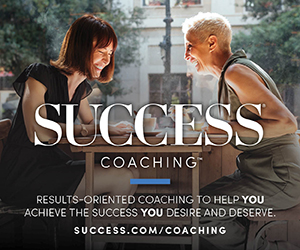
views
Quick Links
SECTIONS
JOIN US
- SUCCESS Coaching
- Speakers Bureau
- SUCCESS Events
- SUCCESS Space
- Newsletter
- Daily SMS
- Subscribe
- Shop the SUCCESS Store
- SUCCESS Coaching
- Speakers Bureau
- SUCCESS Events
- SUCCESS Space
- Newsletter
- Daily SMS
- Subscribe
- Shop the SUCCESS Store
GET IN TOUCH
CONNECT
Instagram Facebook Tiktok Linkedin Pinterest X-twitterMORE

Unlock the Latest Knowledge that Can You Help You Achieve More in Life with More Confidence
Print and Digital Options Available
BOOKMARK Share TABLE OF CONTENTS
TABLE OF CONTENTS


You buy a new blazer to ensure your top half looks great on Zoom. You test your audio multiple times. Your resume is polished, your cover letter impeccable and you have researched your potential new company extensively. Then, you are hit with a question out of left field, and you have no idea why. Maybe it’s, “So tell me about an embarrassing time at work and how you responded?” or “If you were a tree, what tree would you be?”
Like any candidate, you wonder what the heck that has to do with your skills, talent and fit at the company—and you aren’t wrong.
“Transparency is important because the interview process is fairly opaque to candidates that are applying, because they don’t know what’s happening or why it’s happening, so they’re not able to bring their best self to the process,” says Laura Gassner Otting, speaker, author and executive search veteran who believes in asking better interview questions. She adds that many of us haven’t had career counseling for many years, often since high school or college, and it might no longer be relevant, either from changing times or an industry change.
She thinks candidates should understand why a company is asking the question, what they are looking for and more details to give better answers.
The topic was a source of conversation for Madi Baldwin, who works in entrepreneurship and innovation, when she posted about a refreshing interview process on LinkedIn:
Her post garnered over 6,000 reactions and 100 comments for a reason—people wanted to be part of interview processes like that instead of what they’d been through.
Here’s how experts say interviewers, and interviewees, can improve the interview process to be more transparent and ultimately hire better talent.
Anyone who has worked in HR, or served in a hiring role, has likely been handed a short list of basic questions to ask the job candidates they are meeting. Gassner Otting thinks this is a problem.
“The person asks those five questions and has no idea what else to ask or where else to go or why they’re even asking it,” she says. “They also don’t understand that they’re allowed to ask follow-up questions.” She adds that it isn’t helpful to treat everyone exactly the same because all candidates aren’t the same.
Instead, better interview questions need a next level, a level up or a wording swap. She says she wishes it went like this: Instead of “tell me a time something didn’t go well,” you could ask that and also “how did they take ownership of it? How fast was the distance between failure and fix? Did they ask for help early enough in the process? Who did they go to?”
Additionally, Leanne Mair, CEO and founder of Benefactum Consulting and author of Closing the Gap: How to Include Black Women in Any Gender Equity Strategy cautions avoiding “wayward” questions. These might include:
“We’ll be in touch.” It’s the most dreaded phrase for an eager candidate to hear as they hope to find out soon how their interview went and, ultimately, if they will move on to the next round and/or be offered a position. Yet, it tells them nothing.
“Candidates often don’t know the timeframe for decision-making, and they don’t understand the metrics by which they will be judged,” Gassner Otting says. She adds that job seekers also might not know of the listed qualifications that are most important to emphasize.
“Interviewees tend to feel they’re just throwing spaghetti at the wall, darts on a dartboard, hoping something’s going to land, but they don’t really know,” she says. It makes sense—we live in a “litigious” society, she says, so companies feel they have to be very careful not to overshare in the process. Yet, companies can share some information about how they are valuing the metrics or requirements for the job, she says.
Generic, AI-generated job descriptions barely describe the real day-to-day life, let alone specific qualifications a candidate might need to know about.
“Writing a more robust position description also builds the culture of your current employees as well,” Gassner Otting says, as it helps them realize what the company values. “It’s actually reengaging employees in their work. It realigns people around the goals that are at hand.”
“Depending on how many interview rounds there are, having clear feedback collection as to why the candidates didn’t make it to further rounds, but also collecting information from the candidates on how they found the interviews,” says Mair. “This gives a full view on how the process can be improved in the future.”
However, Gassner Otting doesn’t advise giving too much direct, detailed feedback, as it can become “litigious.” “People will not hear what they say; they’ll hear what they feel.” However, if it came down to different certifications, or another black-and-white reason, she says, it can be worth sharing.
“There was never a ‘good’ candidate who asked too many questions who made me think they were a ‘bad’ candidate,’” Gassner Otting shares. “It doesn’t change anything—in fact, it shows me they have skin in the game, that they are interested in the position.” She says that, of course, they shouldn’t overdo questions with frequent emails after interviews, but candidates can also be more transparent themselves by sharing their “why” behind questions as well.
Finally, candidates who don’t feel comfortable at any point in the process should take that as a sign that it’s possible the position and the company culture aren’t aligned with their values.
Photo by Ground Picture/Shutterstock.com
5473 Blair Road, Suite 100
PMB 30053
Dallas, TX 75231
Copyright © 2024 SUCCESS Magazine. All rights reserved.
Unlock the Latest Knowledge that Can You Help You Achieve More in Life with More Confidence
Print and Digital Options Available
Copyright © 2024 SUCCESS Magazine. All rights reserved.
Unlock the Latest Knowledge that Can You Help You Achieve More in Life with More Confidence
Print and Digital Options Available
https://www.success.com/better-interview-questions/























Comments
0 comment